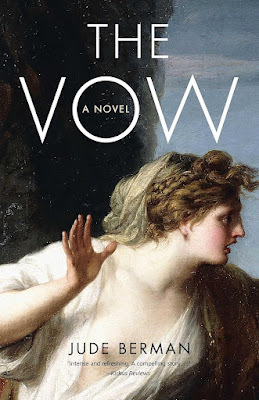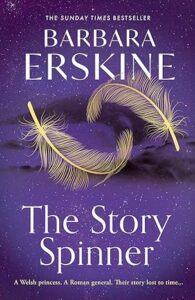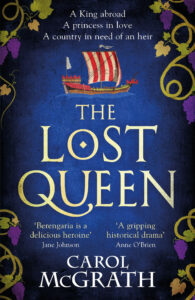Deborah Swift's Blog, page 5
October 20, 2024
The King’s Intelligencer by Elizabeth StJohn #NewRelease #RichardIII #CoffeePotBookClub
 Discovering the Missing Princes in the Tower
London, 1674When children’s bones are unexpectedly unearthed in the Tower of London, England’s most haunting mystery—the fate of the missing princes—is reignited.Franny Apsley, trusted confidante to Charles II’s beloved niece and heir, Lady Mary Stuart, is caught up in the court’s excitement surrounding the find. Yet, as a dark family secret comes to light, Franny realises the truth behind the missing princes is far more complex—and dangerous—than anyone suspects. Recruited by her formidable cousin Nan Wilmot, Dowager Countess of Rochester, to discover the truth behind the bones, Franny is thrust into the shadowy world of intelligencers. But her quest is complicated by an attraction to the charismatic court artist Nicholas Jameson, a recent arrival from Paris who harbours secrets of his own.Pursued by Nicholas, Franny searches for evidence hidden in secret family letters and paintings, and uncovers a startling diplomatic plot involving Lady Mary, which causes Franny to question her own judgment, threatens the throne, and sets England on a course for war. With only her courage and the guidance of an enigmatic spy within the royal household, Franny must decide how far she will go to expose the truth—and whether that truth will lead to England’s salvation or her own heartbreak.In a glittering and debauched society where love is treacherous and loyalty masked, Franny must navigate a world where a woman’s voice is often silenced and confront the ultimate question: What is she willing to risk for the sake of her country, her happiness, and her family’s safety?A captivating historical novel of conspiracy, passion, and courage, The King’s Intelligencer is one woman’s quest for a truth that could change the fate of a nation. A companion to the critically acclaimed best-selling novels The Godmother’s Secret and The Lydiard Chronicles, The King’s Intelligencer weaves together beloved characters and actual events to bring a suspenseful mystery to life.REVIEWI was really looking forward to this having read The Godmother’s Secret, and I loved it even more than that one. I loved the setting – London after the Great Fire, meticulously recreated in both its splendour and squalor, and I immediately warmed to Franny — a great character the reader can instantly root for. The mystery starts almost immediately when the bones of the suspected Princes of the Tower are unearthed at the bottom of a staircase. But were these the bones of the lost child princes, or not? Franny must set out to discover the answer. Of course the discovery will affect the whole of the English monarchy and Charles II himself, as well as Franny’s own family. But discovering the truth is a knife-edge endeavour – the Restoration court is full of spies and political maneuverings which add to the simmering tension in this novel. The attention to detail in the novel is second-to-none, and the authenticity pulls the reader into another world. In this world the women like Nan Wilmot and Franny Aspley, who seemingly have no overt power, have to work behind the scenes to keep their family’s position and ensure justice is done. For Franny this leads to uncomfortable discoveries and hard decisions.I couldn’t put this book down. This is one of the best historical novels I have ever read and certainly one of my books of the year. I recommend it to all lovers of well-written historical fiction, and it would make a wonderful book group pick. Go and buy!
Discovering the Missing Princes in the Tower
London, 1674When children’s bones are unexpectedly unearthed in the Tower of London, England’s most haunting mystery—the fate of the missing princes—is reignited.Franny Apsley, trusted confidante to Charles II’s beloved niece and heir, Lady Mary Stuart, is caught up in the court’s excitement surrounding the find. Yet, as a dark family secret comes to light, Franny realises the truth behind the missing princes is far more complex—and dangerous—than anyone suspects. Recruited by her formidable cousin Nan Wilmot, Dowager Countess of Rochester, to discover the truth behind the bones, Franny is thrust into the shadowy world of intelligencers. But her quest is complicated by an attraction to the charismatic court artist Nicholas Jameson, a recent arrival from Paris who harbours secrets of his own.Pursued by Nicholas, Franny searches for evidence hidden in secret family letters and paintings, and uncovers a startling diplomatic plot involving Lady Mary, which causes Franny to question her own judgment, threatens the throne, and sets England on a course for war. With only her courage and the guidance of an enigmatic spy within the royal household, Franny must decide how far she will go to expose the truth—and whether that truth will lead to England’s salvation or her own heartbreak.In a glittering and debauched society where love is treacherous and loyalty masked, Franny must navigate a world where a woman’s voice is often silenced and confront the ultimate question: What is she willing to risk for the sake of her country, her happiness, and her family’s safety?A captivating historical novel of conspiracy, passion, and courage, The King’s Intelligencer is one woman’s quest for a truth that could change the fate of a nation. A companion to the critically acclaimed best-selling novels The Godmother’s Secret and The Lydiard Chronicles, The King’s Intelligencer weaves together beloved characters and actual events to bring a suspenseful mystery to life.REVIEWI was really looking forward to this having read The Godmother’s Secret, and I loved it even more than that one. I loved the setting – London after the Great Fire, meticulously recreated in both its splendour and squalor, and I immediately warmed to Franny — a great character the reader can instantly root for. The mystery starts almost immediately when the bones of the suspected Princes of the Tower are unearthed at the bottom of a staircase. But were these the bones of the lost child princes, or not? Franny must set out to discover the answer. Of course the discovery will affect the whole of the English monarchy and Charles II himself, as well as Franny’s own family. But discovering the truth is a knife-edge endeavour – the Restoration court is full of spies and political maneuverings which add to the simmering tension in this novel. The attention to detail in the novel is second-to-none, and the authenticity pulls the reader into another world. In this world the women like Nan Wilmot and Franny Aspley, who seemingly have no overt power, have to work behind the scenes to keep their family’s position and ensure justice is done. For Franny this leads to uncomfortable discoveries and hard decisions.I couldn’t put this book down. This is one of the best historical novels I have ever read and certainly one of my books of the year. I recommend it to all lovers of well-written historical fiction, and it would make a wonderful book group pick. Go and buy!Praise for The King’s Intelligencer:
“In her latest literary achievement, Elizabeth St.John delivers a powerful and memorable narrative in The King’s Intelligencer. Through her storytelling, she has woven together an indelible plot that delves into the realms of family, friendship, monarchy, espionage, and love. This book has an irresistible pull that draws you into the story and the lives of those who lived so many years ago.” ~ Yarde Reviews & Book Promotion, 5* Review
“Franny Apsley is a captivating heroine, confident and courageous…her puzzle-solving sleuth work is nothing short of intoxicating for a mystery fan like myself. As an intelligencer, she walks a tightrope of duplicity at great personal risk, and the stakes rise with every step she takes toward the novel’s stunning conclusion.” ~ Amy Maroney, author of the award-winning Sea and Stone Chronicles
“Exquisitely, skilfully and often lyrically written, I also felt captivated by the threads St John weaved into this novel that connect to her previous works like The Godmother’s Secret and The Lady of the Tower. This is a brilliant novel, and a must read for lovers of historical fiction.” ~ Wendy J. Dunn, author of award-winning Tudor fiction
WHAT ARE YOU WAITING FOR? BUY THE BOOK Universal Buy LinkThe post The King’s Intelligencer by Elizabeth StJohn #NewRelease #RichardIII #CoffeePotBookClub first appeared on Deborah Swift.October 15, 2024
The Vow by Jude Berman #NewRelease #CoffeePotBookClub #HistFic
 In a stunning work of feminist historical fiction for readers who loved Dawn Tripp’s Georgia and Whitney Scharer’s The Age of Light, Jude Berman brings painter Angelica Kauffman to life. Accused of dressing as a boy to study in the prestigious galleries of eighteenth-century Italy, child prodigy Angelica Kauffman has set high goals for herself. She is determined to become a history painter, a career off-limits to women. To ensure her success, she has vowed never to marry.When a new patron invites her to London, Angelica befriends famous artists, paints portraits of Queen Charlotte and other royalty, and becomes a founding member of the Royal Academy. While still in London, an alluring but mysterious Swedish count makes her an offer that may be too tempting to resist. Then, upon returning to Italy, she meets Wolfgang von Goethe.Time and time again, Angelica faces the insurmountable obstacles and great personal sacrifices that come with being an independent woman. The vows she makes, big and small, are repeatedly challenged. Will she break free from the traditional male/female binary and the many oppressive social dictates of her time and learn to “paint with her soul” . . . or is a vow of a different sort necessary if she is to answer the deepest call of her heart?BUY from Amazon UK and Amazon USAbout the Author
In a stunning work of feminist historical fiction for readers who loved Dawn Tripp’s Georgia and Whitney Scharer’s The Age of Light, Jude Berman brings painter Angelica Kauffman to life. Accused of dressing as a boy to study in the prestigious galleries of eighteenth-century Italy, child prodigy Angelica Kauffman has set high goals for herself. She is determined to become a history painter, a career off-limits to women. To ensure her success, she has vowed never to marry.When a new patron invites her to London, Angelica befriends famous artists, paints portraits of Queen Charlotte and other royalty, and becomes a founding member of the Royal Academy. While still in London, an alluring but mysterious Swedish count makes her an offer that may be too tempting to resist. Then, upon returning to Italy, she meets Wolfgang von Goethe.Time and time again, Angelica faces the insurmountable obstacles and great personal sacrifices that come with being an independent woman. The vows she makes, big and small, are repeatedly challenged. Will she break free from the traditional male/female binary and the many oppressive social dictates of her time and learn to “paint with her soul” . . . or is a vow of a different sort necessary if she is to answer the deepest call of her heart?BUY from Amazon UK and Amazon USAbout the Author

Jude Berman has a BA in art from Smith College and an Ed D in cross-cultural communication from U Mass Amherst. After a career in academic research, she built a freelance writing and editing business and ran two small Indie presses. She lives in Berkeley, CA, where she continues to work with authors and write fiction. In her free time, she volunteers for progressive causes, paints with acrylic watercolors, gardens, and meditates.
Visit judeberman.com for more information about her books.The post The Vow by Jude Berman #NewRelease #CoffeePotBookClub #HistFic first appeared on Deborah Swift.October 3, 2024
The Dragon Tree by Julia Ibbetson #CoffeePotBookClub #DuLacSeries
~ book tour reviewer“an engaging and original time-slip novel that keeps the reader turning the pages…the characters are authentic and the mystery is neatly woven between the centuries … seamless time transitions”~ Melissa MorganBuy Link:Universal Buy LinkThis series is available on #KindleUnlimited, and in ebook & paperback formats.Series Buy Links:Amazon UKAmazon USAbout Julia Ibbotson
 Julia Ibbotson is fascinated by the medieval world and the concept of time. She is the author of historical mysteries with a frisson of romance. Her books are evocative of time and place, well-researched and uplifting page-turners. Her current series focuses on early medieval time-slip/dual-time mysteries. Julia read English at Keele University, England, specialising in medieval language/ literature/ history, and has a PhD in socio-linguistics.After a turbulent time in Ghana, West Africa, she became a school teacher, then a university academic and researcher. Her break as an author came soon after she joined the RNA’s New Writers’ Scheme in 2015, with a three-book deal from Lume Books for a trilogy (Drumbeats) set in Ghana in the 1960s. She has published five other books, including A Shape on the Air, an Anglo-Saxon timeslip mystery, and its two sequels The Dragon Tree and The Rune Stone.Her work in progress is a new series of Anglo-Saxon mystery romances, beginning with Daughter of Mercia, where echoes of the past resonate across the centuries.Her books will appeal to fans of Barbara Erskine, Pamela Hartshorne, Susanna Kearsley, and Christina Courtenay. Her readers say: ‘Julia’s books captured my imagination’, ‘beautiful story-telling’, ‘evocative and well-paced storylines’, ‘brilliant and fascinating’ and ‘I just couldn’t put it down’.Author Links:Website • Twitter • Facebook • InstagramBookBub • Pinterest • Amazon Author PageLinkedIn • Goodreads
Julia Ibbotson is fascinated by the medieval world and the concept of time. She is the author of historical mysteries with a frisson of romance. Her books are evocative of time and place, well-researched and uplifting page-turners. Her current series focuses on early medieval time-slip/dual-time mysteries. Julia read English at Keele University, England, specialising in medieval language/ literature/ history, and has a PhD in socio-linguistics.After a turbulent time in Ghana, West Africa, she became a school teacher, then a university academic and researcher. Her break as an author came soon after she joined the RNA’s New Writers’ Scheme in 2015, with a three-book deal from Lume Books for a trilogy (Drumbeats) set in Ghana in the 1960s. She has published five other books, including A Shape on the Air, an Anglo-Saxon timeslip mystery, and its two sequels The Dragon Tree and The Rune Stone.Her work in progress is a new series of Anglo-Saxon mystery romances, beginning with Daughter of Mercia, where echoes of the past resonate across the centuries.Her books will appeal to fans of Barbara Erskine, Pamela Hartshorne, Susanna Kearsley, and Christina Courtenay. Her readers say: ‘Julia’s books captured my imagination’, ‘beautiful story-telling’, ‘evocative and well-paced storylines’, ‘brilliant and fascinating’ and ‘I just couldn’t put it down’.Author Links:Website • Twitter • Facebook • InstagramBookBub • Pinterest • Amazon Author PageLinkedIn • GoodreadsThe post The Dragon Tree by Julia Ibbetson #CoffeePotBookClub #DuLacSeries first appeared on Deborah Swift.
September 29, 2024
The Pirate’s Physician by Amy Maroney
 When her world shatters, she dares to trust a pirate. Will she survive what comes next?
When her world shatters, she dares to trust a pirate. Will she survive what comes next?
The Pirate’s Physician is the story of Giuliana Rinaldi, a student at Salerno’s famed medieval medical school, whose lifelong dream of becoming a physician crumbles when her uncle and mentor dies suddenly.
Faced with an unwanted marriage to a ruthless merchant, Giuliana enlists the help of a Basque pirate and flees home for the dangers of the open sea.
Will she make it to Genoa, where her only remaining relative awaits? Or will this impulsive decision seal her own doom?
A delightful seafaring adventure packed with romance and intrigue, The Pirate’s Physician is a companion novella to the award-winning Sea and Stone Chronicles series of historical novels by Amy Maroney: Island of Gold, Sea of Shadows, and The Queen’s Scribe
REVIEW:
This is a fabulous historical novella full of action and intrigue, with a beautiful setting and much to interest anyone who likes books about herbalism or ancient medicine. Giulia Rinaldo, a student physician, is based on a real-life physician practising in the days when the ideas of Arabic medicine (and women in the profession) were far ahead of the time. Desperate to escape her old and ugly Florentine suitor who has a claim on her because of an inheritance, Giulia risks all to embark on a journey with Captain Eneko – a gorgeous and dashing pirate. The romance is very swoonworthy! The detail in this novella takes you firmly into her 15th Century world, with immersive descriptions of sea voyages, Mediterranean palaces, and danger and at every turn. All the characters are well-drawn and vivid, and I particularly enjoyed the maidservant Rosetta, who provided both comfort and grit. Wonderful escapism and highly recommended for a winter romantic read.
Praise for the Sea and Stone Chronicles:
“Island of Gold is a nimbly told story with impeccable pacing.” ~ Historical Novel Society, Editor’s Choice Review
“Sea of Shadows is stunning. A compelling tale of love, honor, and conviction.” ~ Reader’s Favorite Review
“The Queen’s Scribe is a vividly visual adventure set at the tumultuous court at Nicosia, where deathly intrigues match those of the Italian and French states. There is a constant sense of danger, sometimes stronger, at other times more subtle, that runs through the whole novel. It makes for nail-biting reading.”~ 5* Review, Ruins & Reading
Amy Maroney is the author of the award-winning Miramonde Series, the story of a Renaissance-era female artist and the modern day scholar on her trail.
BUY THE BOOK Universal Buy LinkAbout Amy Maroney
 Amy Maroney lives in the Pacific Northwest with her family, and spent many years as a writer and editor of nonfiction before turning her hand to historical fiction.Amy is the author of the Miramonde Series, a trilogy about a Renaissance-era female artist and the modern-day scholar on her trail. Amy’s new series, Sea and Stone Chronicles, features strong, talented women seeking their fortunes in the medieval Mediterranean.To receive a free prequel novella to the Miramonde Series, join Amy Maroney’s readers’ group at www.amymaroney.com.
Amy Maroney lives in the Pacific Northwest with her family, and spent many years as a writer and editor of nonfiction before turning her hand to historical fiction.Amy is the author of the Miramonde Series, a trilogy about a Renaissance-era female artist and the modern-day scholar on her trail. Amy’s new series, Sea and Stone Chronicles, features strong, talented women seeking their fortunes in the medieval Mediterranean.To receive a free prequel novella to the Miramonde Series, join Amy Maroney’s readers’ group at www.amymaroney.com.
Author Links:
Website • Twitter • FacebookInstagram • Pinterest • BookBubAmazon Author Page • Goodreads The post The Pirate’s Physician by Amy Maroney first appeared on Deborah Swift.
The post The Pirate’s Physician by Amy Maroney first appeared on Deborah Swift.
September 25, 2024
Apollo’s Raven by Linea Tanner #CoffeePotBookClub #Spotlight #Free
 *Apollo’s Raven will be FREE to download September 26th – 30th, 2024*September 26th, 2024Publication Date: January 20th, 2020 (3rd edition)Publisher: Apollo Raven Publisher LLCPages: 394Genre: Historical Fantasy / Historical FictionAudiobook Narrator: Kristin JamesA Celtic warrior princess is torn between her forbidden love for the enemy and duty to her people.
*Apollo’s Raven will be FREE to download September 26th – 30th, 2024*September 26th, 2024Publication Date: January 20th, 2020 (3rd edition)Publisher: Apollo Raven Publisher LLCPages: 394Genre: Historical Fantasy / Historical FictionAudiobook Narrator: Kristin JamesA Celtic warrior princess is torn between her forbidden love for the enemy and duty to her people. AWARD-WINNING APOLLO’S RAVEN sweeps you into an epic Celtic tale of forbidden love, mythological adventure, and political intrigue in Ancient Rome and Britannia. In 24 AD British kings hand-picked by Rome to rule are fighting each other for power. King Amren’s former queen, a powerful Druid, has cast a curse that Blood Wolf and the Raven will rise and destroy him. The king’s daughter, Catrin, learns to her dismay that she is the Raven and her banished half-brother is Blood Wolf. Trained as a warrior, Catrin must find a way to break the curse, but she is torn between her forbidden love for her father’s enemy, Marcellus, and loyalty to her people. She must summon the magic of the Ancient Druids to alter the dark prophecy that threatens the fates of everyone in her kingdom.
Will Catrin overcome and eradicate the ancient curse? Will she be able to embrace her forbidden love for Marcellus? Will she cease the war between Blood Wolf and King Amren and save her kingdom?
Praise for Apollo’s Raven:“If you mingled the history and romance of Philippa Gregory with the magical fantasy of George R.R. Martin, the result just might be the fascinating Apollo’s Raven (Curse of Clansmen and Kings Book 1) by Linnea Tanner. Get ready for a journey filled with the desires of star-crossed lovers, the horror of a son polishing his own mother’s skull and the fantasy of humans becoming creatures as a tool to save their very humanity.”“Sorcery? Mythology? Forbidden love? An ancient curse? Yes, please! I fully enjoyed this epic tale of intrigue, deception, and love. The characters are developed well, while the plot leaves the reader wanting more.”Book Trailer:https://www.youtube.com/watch?v=oqSdT5wK4aIBuy Link:Universal Buy Link This title is available to read on #KindleUnlimited.Series Titles’ Buy Links:Apollo’s Raven (Book #1)Dagger’s Destiny (Book #2)Amulet’s Rapture (Book #3)Skull’s Vengeance (Book #4)Series Links:Amazon USAmazon UKAuthor Links:Website • Facebook • Instagram • Twitter / X • PinterestAmazon Author Page • BookBub • Threads • LinkedIn • GoodreadsThe post Apollo’s Raven by Linea Tanner #CoffeePotBookClub #Spotlight #Free first appeared on Deborah Swift.September 24, 2024
Inceptio by Alison Morton #AlternativeHistory #Rome #Thriller #Review
I have been meaning to get to this series for ages, but was prompted to read it by the fact I met Alison Morton at the Historical Novel Society conference, and that this book is now celebrating ten years of success. I know nothing about Ancient Rome except for being a bity of a mythology buff, but of course this didn’t matter because this book is set in the new land of Roma Nova – a place in which the Roman Empire still exists in a new incarnation.
Roma Nova is technically advanced – as you might expect when the engineers of Rome survived – and so the novel would also appeal to those that like reading science fiction as well as historical fiction. As a sort of outpost of the EU, Roma Nova has many political problems, and an army to deal with them.
The main protagonist is a Karen Brown, a New York office worker and park volunteer. The plot kicks off when forces outside her control mean she must relocate in a hurry to the land where her grandmother still lives – Roma Nova, which was founded sixteen hundred years ago by Roman exiles. Roman Nova is a matriarchal society with rules very different from the USA.
There is a very bad guy after her, Renschman, who is intent on getting hold of her inheritance – a multi-million business that the US government wants to get control of, and keep in the US. Karen has several very scary run-ins with this guy, including being left to freeze to death, and it’s enough to make her want to take a chance on a new life.
After she flees to Roma Nova she meets her grandmother Nonna who is a lovely character, and a great foil for all the dangerous characters that she has to deal with. After a particularly frightening incident in which the bad guy tracks her down, she is persuaded to go on a boot camp of special training which will maker her a member of one of the foremost SAS type special forces. Thus begins her transformation from New York office girl to Carina Mitela, efficient fighting machine – and she certainly needs those skills!
There is a touch of romance, with Roma Nova native Conradus Tellus, a great big lion of a man, but this is more of a political thriller than a romance, and Carina more than holds her own in this relationship. The world-building is immaculately done, with the author’s enthusiasm to keep Rome not only alive but developing, evident on every page. This is a genre bending novel and the first of a series. If you like an action-packed thriller with a strong female protagonist and impeccable world-building, do give this a try..
BUYTHE BOOK Barnes & Noble Amazon Waterstones Online or through your local bookshop. (UK link)
 About Alison Morton
About Alison Morton
Alison Morton writes award-winning thrillers set in an imaginary European country where a remnant of the ancient Roman Empire still exists and is ruled by women who face conspiracy, revolution and heartache but with a sharp line in dialogue.
The Historical Novel Society selected SUCCESSIO, AURELIA, INSURRECTIO and JULIA PRIMA as Editor’s Choices. AURELIA was a finalist in the 2016 HNS Indie Award. SUCCESSIO featured as Editor’s Choice in ‘The Bookseller’.
Alison has misspent decades clambering over Roman sites throughout Europe, especially French ones. A former soldier and translator, she holds an MA History, blogs about history, social media and writing. Alison lives in Poitou in France, the home of Mélisende, the heroine of her two contemporary thrillers, Double Identity and Double Pursuit.
Find Alison at her website alison-morton.com
The post Inceptio by Alison Morton #AlternativeHistory #Rome #Thriller #Review first appeared on Deborah Swift.August 9, 2024
The Story Spinner by Barbara Erskine #Timeslip #Roman #Mabinogion
The land of the Silures, 382 AD
Elen is a princess promised to a general of Rome. Macsen came to Wales seeking an alliance that would advance his quest for power.
Despite warnings her marriage is destined for heartache, Elen is determined to honour her vows.
But this union will change her destiny forever…
Camp Meadow, 2024
Cadi is a writer who has discovered Elen’s lost story. As she puts pen to paper, she hears the sound of ghostly marching feet.
Opening the gate to the ancient meadow behind her cottage, could the secret behind Elen’s fate lie closer than she thinks?
But someone is desperate to keep the past buried, plotting to destroy the meadow…
Can Cadi uncover Elen’s story before it’s lost to time?
REVIEW
 I’ve read quite a few of Barbara Erskine’s books and this is one of her very best. It has all the ingredients her fans would expect; real history, myth and mysticism all sewn together into a gripping plot.
I’ve read quite a few of Barbara Erskine’s books and this is one of her very best. It has all the ingredients her fans would expect; real history, myth and mysticism all sewn together into a gripping plot.
I love timeslip novels and this is one of the best, incorporating Roman history, the Welsh myths of the Mabinogion and a modern woman’s battle to save the very special landscape where she lives.The plot centres around a particular location, a field behind a cottage in a small village where it is possible that a Roman villa or palace once stood. There is a mysterious ‘wormhole’ in the field which enables people tp pass from present to past and vice versa when the veil between the worlds is thin.Cadi, a writer, is fascinated by this but discovers that a developer is about to build houses on this precious site.The developer turns out to be the main antagonist in the book, and someone who has had dealings with Cadi before and their relationship has what you might call ‘history’.Both the Roman aspect of the book and the modern day story are equally strong. Cadi and Elen are fantastic characters, each distinct and belonging to their respective periods, and I was particularly fond of Uncle Meryn, a professor who believes in the possibilities others won’t entertain! There is believable history behind the story and it has been thoroughly researched – immersing the reader in the detail of life thousands of years ago, as well as describing the detailed forensic and archaeological information of today.There are several other lovely characters in the book; Rachel the illustrator, Charles the academic and Kate the Vicar. The sense of community in the village location is very appealing, and I couldn’t help but root for all those who wanted to save the field from being built over.Special mention must go to Gemma the dog, who found the ‘otherworld’ first of all and lived to tell the tale (or should that be wag the tail?)!BUY THE BOOKThe post The Story Spinner by Barbara Erskine #Timeslip #Roman #Mabinogion first appeared on Deborah Swift.
July 29, 2024
Fortune’s Wheel by Carolyn Hughes #Audiobook #CoffeePotBookClub
 Praise for Fortune’s Wheel:“A thoroughly researched book, with care given to ensuring that the characters have 14th century attitudes and knowledge…gives a strong sense of the reality of the past.”~ Catherine Meyrick, author of Cold Blows the WindReading Buy Links:This novel is available to read on #KindleUnlimited.🎧 Listening Buy Links :Audiobook Buy Links:Audible UK / Audible US
Praise for Fortune’s Wheel:“A thoroughly researched book, with care given to ensuring that the characters have 14th century attitudes and knowledge…gives a strong sense of the reality of the past.”~ Catherine Meyrick, author of Cold Blows the WindReading Buy Links:This novel is available to read on #KindleUnlimited.🎧 Listening Buy Links :Audiobook Buy Links:Audible UK / Audible USCarolyn Hughes Author Links:
Website • Twitter • Facebook • BlueskyAmazon Author Page • BookBub • GoodreadsThe post Fortune’s Wheel by Carolyn Hughes #Audiobook #CoffeePotBookClub first appeared on Deborah Swift.July 19, 2024
Why women joined the Crusades – The Lost Queen by Carol McGrath #NewRelease #Medieval
Why Did Women Join the Crusades?
Why did women join Crusades? The importance of spiritual health during the medieval period cannot be underestimated. It was a way of cleansing the soul from the taint of sin, a penitential exercise and so there were female pilgrims. Yet, female visits to Holy Sites during menstruation was not acceptable to the Church. Monthly bleeding rendered women spiritually unpure. They were not deterred. One story circulated at the time concerning a woman who set out with her goose on the First Crusade- the goose led her and she followed it accompanied by a credulous crowd.
Outremer was lucrative for trade and during the era female sole traders especially from Genoa and Pisa moved to the cities of the middle eastern kingdom. Nuns visited and many stayed and established orders in the Holy Land. Queens travelled with spouses and since sexual relations continued whilst on Crusade pregnancies occurred. Joan of Acre, daughter to Edward I and Eleanor of Castile was famously born in Acre.There also had been an established royal family in Jerusalem for decades- a King and Queen and female nobility in Outremer, often widows and heiresses. Diplomatic marriages were made by Franks (European Christians) throughout the Holy Land. Noble women provided diplomatic support as Berengaria did in Rome after Richard I was imprisoned in Austria on his return from the Third Crusade. Queens Regnant were responsible for the defense of their territory against Muslim enemies. They recruited troops and organised campaigns. Queen Melisande of Jerusalem 1131-1153 ruled with her son Baldwin III. She sent a military force to relieve Odessa from the enemy. She was known to her contemporaries as “a wise and cautious woman with a manly heart”.Holy women joined the Crusades drawing authority from visions as evidence of piety. Women visionaries and recluses set up in Acre and Jerusalem. Some Crusade Chronicles invented stories about women crusaders to improve their narrative. Florina, daughter of Hugh of Burgundy was said to have died fighting in battle, late autumn 1097. She had hoped to marry the son of the King of Denmark if the expedition was successful. Their army was attacked by the Turks whilst crossing the Kingdom of Rhum (Turkey) but both were killed. The dates for this tale do not work and she would only have been fourteen years old. She was likely an invention as a moral warning to women of the dangers of going on Crusade. This story is in several chronicles including Albert of Achen. Marriage alliances united crusading families and marriages were not unknown between Muslims and Christians without either party converting.
 The Lost Queen – Review
The Lost Queen – Review
Another strong novel by Carol McGrath told mostly through the eyes of two women – Berengaria of Navarre, (Richard the Lionheart’s wife) and Avelina of Middleton who sets out searching for her husband who was lost on a previous crusade, defending Outremer from Saladin’s forces. Both characters are fully realised and I particularly enjoyed meeting Berengaria, who like many women of the era was marrying for the convenience of political alliance.
Avelina’s strength is her determination, and she joins some nuns who are also travelling on pilgrimage and through a series of serendipitous encounters they meet up with the Royal entourage of Eleanor of Aquitaine, who is escorting Berengaria to meet her son. As a Queen, Berengaria never sets foot in England (thus, The Lost Queen) and I knew little about her from the outset, and learned the history as I went along, on Berengaria’s shoulder as she navigates snow-capped Alps, attacks by assassins and all manner of hardships during her long travels to meet a man, who quite frankly, is far more concerned with military supremacy than he is with any wife. I also really empathised with her as she has to deal with Eleanor of Aquitaine, who came across as a real gorgon of a prospective mother-in-law. Avelina’s role in the story as Berengaria’s friend really helped the reader understand the power of female friendship in those times.
Carol McGrath has a great way of uncovering little known Medieval women with fascinating lives and this is no exception. Her depth of knowledge of the period is apparent in all the tiny details of clothing, crafts, setting and courtly life. and her attention to detail in the similes she chooses – such as ‘her back straight as a stiff reed growing on a riverbank’. Carol McGrath never strays from the period.
The courtly life of poetry, song and chivalry is contrasted with the violence and bloodshed of war. Berengaria’s court and life in the Kingdom of Jersusalem gives a real immersion into a different way of living and highlights the turmoil that existed between different religious persuasions and the power-mongering of rival states. The book serves to highlight how women were often left behind by their men, often with little news about what had become of them.
If you love carefully researched historical fiction, with total command of the detail and the history, this is a book for you.
Highly recommended.
BUY THE BOOK1191 and the Third Crusade is underway . . .
It is 1191 and King Richard the Lionheart is on crusade to pitch battle against Saladin and liberate the city of Jerusalem and her lands. His mother, the formidable Eleanor of Aquitaine and his promised bride, Princess Berengaria of Navarre, make a perilous journey over the Alps in midwinter. They are to rendezvous with Richard in the Sicilian port of Messina.
There are hazards along the way – vicious assassins, marauding pirates, violent storms and a shipwreck. Berengaria is as feisty as her foes and, surviving it all, she and Richard marry in Cyprus and continue to the Holy Land. England needs an heir. But first, Richard and his Queen must return home . . .
The Lost Queen is a thrilling medieval story of high adventure, survival, friendship and the enduring love of a Queen for her King.
Acclaim for Carol McGrath’s ROSE trilogy:
‘Powerful, gripping and beautifully told’ KATE FURNIVALL on The Silken Rose
‘A tour de force of gripping writing, rich historical detail and complex, fascinating characters’ NICOLA CORNICK on The Stone Rose
‘A beautifully narrated novel’ K J MAITLAND on The Damask Rose
July 9, 2024
The Virgins of Venice by Gina Buonaguro
 After arriving at the convent, Justina takes solace in her aunt Livia, one of the nuns, and in the growing knowledge that all is not strictly devout at San Zaccaria. Justina is shocked to discover how the women of the convent find their own freedom in what seems to her like a prison. But secrets and scandals breach the convent walls, and Justina learns there may be even worse fates for her than the veil, if La Diamante makes good on her threats.Desperate to protect herself and the ones she loves, Justina turns to Luca for help. She finds she must trust her own heart to make the impossible decisions that may save or ruin them all.Buy the Book:Universal Buy Link General Buy LinksAbout Gina:
After arriving at the convent, Justina takes solace in her aunt Livia, one of the nuns, and in the growing knowledge that all is not strictly devout at San Zaccaria. Justina is shocked to discover how the women of the convent find their own freedom in what seems to her like a prison. But secrets and scandals breach the convent walls, and Justina learns there may be even worse fates for her than the veil, if La Diamante makes good on her threats.Desperate to protect herself and the ones she loves, Justina turns to Luca for help. She finds she must trust her own heart to make the impossible decisions that may save or ruin them all.Buy the Book:Universal Buy Link General Buy LinksAbout Gina:
 GINA BUONAGURO is the co-author of The Wolves of St. Peters, Ciao Bella and The Sidewalk Artist, as well as several romance titles under the name Meadow Taylor. The Virgins of Venice is her first solo novel. She has a BA in English from Villanova University in Pennsylvania and earned an MA in English from the University of British Columbia while on a Fulbright Scholarship. Born in New Jersey, Gina Buonaguro lives in Toronto.Find Gina:Website • Facebook • BookBubAmazon Author Page • LinkedIn • Goodreads
GINA BUONAGURO is the co-author of The Wolves of St. Peters, Ciao Bella and The Sidewalk Artist, as well as several romance titles under the name Meadow Taylor. The Virgins of Venice is her first solo novel. She has a BA in English from Villanova University in Pennsylvania and earned an MA in English from the University of British Columbia while on a Fulbright Scholarship. Born in New Jersey, Gina Buonaguro lives in Toronto.Find Gina:Website • Facebook • BookBubAmazon Author Page • LinkedIn • Goodreads
 The post The Virgins of Venice by Gina Buonaguro first appeared on Deborah Swift.
The post The Virgins of Venice by Gina Buonaguro first appeared on Deborah Swift.



